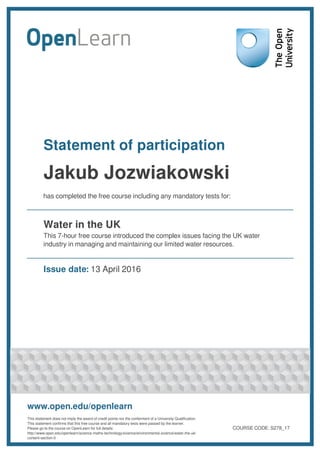
S278_17_statement
- 1. Statement of participation Jakub Jozwiakowski has completed the free course including any mandatory tests for: Water in the UK This 7-hour free course introduced the complex issues facing the UK water industry in managing and maintaining our limited water resources. Issue date: 13 April 2016 www.open.edu/openlearn This statement does not imply the award of credit points nor the conferment of a University Qualification. This statement confirms that this free course and all mandatory tests were passed by the learner. Please go to the course on OpenLearn for full details: http://www.open.edu/openlearn/science-maths-technology/science/environmental-science/water-the-uk/ content-section-0 COURSE CODE: S278_17
- 2. Water in the UK http://www.open.edu/openlearn/science-maths-technology/science/environmental-science/water-the-uk/ content-section-0 Course summary Water is arguably the most important physical resource as it is the one that is essential to human survival. Understanding the global water cycle and how we use water is essential to planning a sustainable source of water for the future. Globally, there are many areas that do not have enough water to support the current population adequately. Decisions will have to be made on the best way to use water in a world where there is climate change. This free course looks at Water in the UK where water supplies are limited in certain areas, as shown by recent droughts. Learning outcomes By completing this course, the learner should be able to: describe how water is used in the UK and the organisation of water supply and sewage responsibilities and legislation explain how the demand for water in England and Wales has changed between 1971 and 2001, recognise the factors involved in predicting future demand including climatic change, and discuss the importance of predictions and their limitations discuss variations in the amounts of water used in different parts of England and Wales, and how water might be used more effectively. Contrast the proportions of surface water and groundwater used for the public water supply in different areas in England and Wales, identify the main aquifers, list the possible schemes for increasing water supply in England and Wales, and discuss their suitability. http://www.open.edu/openlearn COURSE CODE: S278_17
- 3. Water in the UK Completed study The learner has completed the following: Section 1 The UK water supply Section 2 Water abstraction and its uses Section 3 Prediction of demand Section 4 Reducing demand Section 5 Changing climate Section 6 Future supply Section 7 Conclusion http://www.open.edu/openlearn COURSE CODE: S278_17 Powered by TCPDF (www.tcpdf.org)